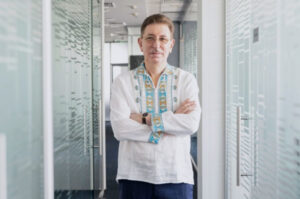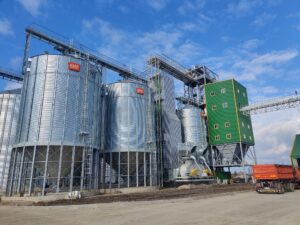
Oleksandr Sosis owns 99.9999% of the shares of PJSC Ukrainian Joint-Stock Insurance Company ASKA-Life (Kyiv), according to the insurer’s announcement in the information disclosure system of the National Securities and Stock Market Commission (NSSMC). As reported, according to the NSSMC, as of the end of 2024, 55.6667% of the company was owned by SCM Finance Limited, 44.3333% – by Alexander Sosis. At the same time, Sosis is the main shareholder of Alliance Bank (Kyiv) with a stake of 89.289%.
In October 2024, the Antimonopoly Committee of Ukraine (AMCU) granted him permission to acquire control over ASKA-Life.
On April 3, 2025, Anna Dugadko, a member of the Supervisory Board of ASKA-Life as a representative of SCM Finance Limited, was removed from the company’s Supervisory Board after the alienation of the beneficiary’s shares.
ASKA-Life Insurance Company was registered in 2003 and specializes in life insurance.
According to the NBU, in 2024, ASKA Life collected UAH 136.2 million in insurance premiums and made insurance payments of UAH 7.915 million. Its eligible assets amounted to UAH 215 million, and technical reserves amounted to UAH 121.145 million.
The authorized capital is UAH 49.625 million.

Vitagro Group is completing the construction of two new silos with a capacity of 11 thousand tons of simultaneous storage at its elevator in Izyaslav district, Khmelnytsky region, and is preparing a 15 thousand ton storage area in grain bins, the company’s press service reports.
According to the report, the total capacity of the elevator will increase to 66 thousand tons of simultaneous storage. The work is scheduled to be completed in early summer 2025 to store the new winter crop.
“We started working on the project in the fall of 2024. At the same time, we contracted equipment and planned the construction schedule. In total, approximately UAH 153 million will be spent on the first stage of the project. As part of the capacity increase, we will not only increase the storage volume but also add another working tower, which will allow us to accept two different crops at the same time and load grain in parallel on rail and road transport. At the same time, the shipment speed will increase from 1400 tons per day to 2300 tons per day,” explained Alexander Kulygin, Director of Grain Storage at Vitagro Group.
Vitagro reminded that it started developing the elevator business in 2017 with the construction of an elevator in Zakupne village, Kamianets-Podilskyi district, Khmelnytskyi region. The group now owns five elevators in Khmelnytsky and Rivne regions with a total capacity of 385 tons of simultaneous storage. The largest of them is in Zakupne. Its current capacity is 106 thousand tons.
Vitagro Group is one of the largest industrial groups in Ukraine with assets in the agricultural, energy, processing, construction and chemical industries. It was founded and has been operating since 1998. It owns enterprises in Khmelnytsky, Rivne, Volyn, Ivano-Frankivsk and Kyiv regions. The company cultivates about 90 thousand hectares of land and is engaged in livestock farming, horticulture, renewable energy, fertilizer and feed production, construction and building materials production. During the full-scale invasion, the group built and launched 5 processing plants. Vitagro is headquartered in Khmelnytsky.
According to the Unified State Register of Legal Entities and Individual Entrepreneurs, the ultimate beneficiary of the Vitagro investment company is MP Serhiy Labaziuk (For the Future parliamentary faction).

In 2024, coffee producer Galka PrJSC (Lviv) reduced its profit by 7.5% to UAH 2.7 million compared to 2023.
According to the decision of the shareholders’ meeting published in the information disclosure system of the National Securities and Stock Market Commission (NSSMC), it was decided to pay dividends in the amount of UAH 4,497,204, which is UAH 12.85 per ordinary registered share.
The Management Board was obliged to compile a list of persons entitled to receive dividends by April 23, 2025, and to pay dividends directly to shareholders within six months from the date of the general meeting’s decision to pay dividends by transferring them to shareholders’ bank accounts or, at their request, at the company’s cash desk.
“Pay the entire amount of dividends in full. To notify the persons entitled to receive dividends of the date, amount, procedure and term of their payment by posting a relevant notice on the company’s website,” the minutes of the general meeting read.
According to the Opendatabot service, in 2024, Galka slightly increased its revenue to UAH 5.274 million, which actually corresponds to the pre-war level of UAH 5.29 million in 2021. Debt obligations increased by 20.2% to UAH 504.2 thousand, while assets decreased by 6.6% to UAH 24.11 million.
Galka PrJSC was established in 1994 on the basis of a Lviv coffee factory that started its operations in 1932 as the Lviv Cooperative Factory of Coffee Additives “Suspilny Promyshl”. Since its inception, the company has specialized in the production of chicory and malt coffee “Luna”, as well as Prajin coffee substitutes. In 1971, the company installed Niro Atomizer equipment for the production of instant coffee, which Lviv Coffee Factory began exporting. The capacity of the Ukrainian-English manufacturer Galka is currently 120 thousand packs of coffee per day.
The major shareholders are Yaroslav Volynets (8.9%) and Lydia and Andriy Volynets (6.9% each), Natalia, Olga and Yuriy Dubovy (7.7% each), Roman and Volodymyr Pasternak (7.1% and 7.6%), Iryna Popovych (7.1%), and Galka Holding LLC (19.39%).

In January-February 2025, Ukraine produced 0.9 million tons of milk, which is 3.5% less than in the corresponding period of 2024, according to Infagro, an industry information and analytical agency.
In February, agricultural enterprises produced 1.7% more milk than in February 2024. Given that 2024 was a leap year, the annual growth in February was 5.3%, analysts said.
Experts emphasized that as of March 1, there were 1.15 million cows in Ukraine, which is 8.4% less than on the same date last year. Official figures for the number of cows in agricultural enterprises showed a negative annual trend with a slight decrease of 0.1% by March 1, 2024.
“In April, we can expect stabilization of the milk market due to the growth of overall demand, which means that the rate of decline in purchase prices will slow down, price revisions will become pointwise,” Infagro emphasized.
At the same time, in March 2025, the purchase price of raw milk in Ukraine continued to decline, with prices returning to approximately the level of September 2024. The March price correction was more severe than in February. Competition for raw materials has resumed due to the projected growth in promotional sales of dairy products in the domestic market and increased European demand for Ukrainian goods, especially butter.
Analysts noted that the supply of raw materials in the domestic market continues to grow. New production facilities and new projects in the dairy industry are being launched. Therefore, the pressure on the price of milk is still there.
The average cost of raw materials in March 2025 in agricultural enterprises was 16.6 UAH/kg excluding VAT, which is 5.1% lower than in February, but 15% higher than in March 2024; the cost of raw materials from the population was 10.5 UAH/kg excluding VAT, which is 4.1% lower than in February, but 14% higher than in March 2024.
The range of milk prices at the end of March was mainly from agricultural enterprises – 15.8-17.0 UAH/kg excluding VAT, and from households – 9.5-11.0 UAH/kg excluding VAT.
“The estimated margin of milk production continued to decline in March. The average estimated operating margin in March amounted to 15%, which is 7 points less than in February and 29 points lower than in March 2024,” Infagro summarized.

The article presents key macroeconomic indicators of Ukraine and the world economy for January-December 2024. The analysis is based on official data from the State Statistics Service of Ukraine, the National Bank of Ukraine, the IMF, the World Bank, and the United Nations, on the basis of which Maksim Urakin, PhD in Economics, founder of the Experts Club information and analytical center, presented an analysis of macroeconomic trends in Ukraine and the world. Such key aspects as the dynamics of gross domestic product (GDP), inflation, unemployment, foreign trade and public debt of Ukraine, as well as global macroeconomic trends were considered.
Ukraine’s macroeconomic performance
Ukraine’s economy showed moderate growth in 2024 despite ongoing challenges related to war and external economic factors. According to the State Statistics Service of Ukraine, the country’s real GDP grew by 2.9% year-on-year . Nominal GDP amounted to UAH 7.66 trillion, with a deflator at 12.3%.
“Despite the challenges associated with the war and unstable geopolitical situation, Ukraine has managed to hold macroeconomic stability. GDP growth of 2.9% is a signal of economic recovery and investor confidence,” Maksim Urakin noted.
Inflation remains a significant problem for the economy. According to the State Statistics Service of Ukraine, annual inflation reached 12% in December 2024, accelerating from 11.2% in November . Consumer prices rose by 1.4% in December compared to November.
“The rise in inflation is a worrying signal. It is the result not only of internal factors, but also of external pressures: rising import prices, energy risks, as well as exchange rate fluctuations. The policy of the National Bank will play a crucial role in stabilizing the situation,” the expert explained.
The negative balance of foreign trade in goods in January-November 2024 increased by 3.6% compared to the same period of 2023, reaching $25.239 billion . Exports rose 16.5% to $38.423 billion and imports rose 11% to $63.662 billion.
“The increase in the negative trade balance suggests that imports are outpacing exports. Ukraine should focus on expanding its export potential and supporting strategic industries: agro-industrial complex, IT and machine building,” Urakin emphasized.
Ukraine’s international reserves reached $43.788 billion as of January 1, 2025, having increased by 9.7% in December.
“This is a positive signal. Reserves are growing due to receipts from international partners. This ensures macro-financial stability and stability of the hryvnia,” the expert said.
Global economy
According to IMF forecasts, global economic growth in 2024 amounted to 3.2% . However, geopolitical instability, trade wars and slowing growth in key economies continue to put pressure on the outlook.
“The global economy is recovering but remains vulnerable. Geopolitical risks, high interest rates and lower consumer demand in developed countries are the main factors of instability,” said Urakin.
The U.S. economy showed stable growth. According to the US Bureau of Economic Analysis, the country’s GDP grew by 2.4% year-on-year in the fourth quarter of 2024, helped by a rise in consumer spending
“Strong domestic demand is a driver of the U.S. economy. However, rising debt burdens and expensive credit could slow the momentum in 2025,” the economist said.
The Eurozone economy showed weak growth rates. In the fourth quarter of 2024, Eurozone GDP grew by 0.1% quarter-on-quarter .
India continues to show stable growth. According to the Indian government, the country’s GDP grew by 8.2% in 2024.
China’s economy grew 4.6% in the third quarter of 2024, but the forecast for the year was lowered to 4.8% due to weak domestic demand and difficulties in the real estate sector.
“China needs to restart domestic consumption. Without demand stimulus, growth may slow down even more,” the expert emphasized.
Conclusion
Economic indicators of Ukraine and the world for 2024 show a mixed picture. GDP growth and positive signals in global markets are combined with inflation risks and foreign trade imbalances. The global economy is also under pressure from multiple uncertainties.
“For Ukraine, the key challenges remain structural reforms, increasing exports, modernizing infrastructure and actively attracting investment. This is the key to sustainable economic growth in 2025 and beyond,” summarized Maksim Urakin.

Serbia has signed a €50 million contract with Eviden, a member of the Atos group, to develop a supercomputer and artificial intelligence (AI) technologies. The move is aimed at strengthening the country’s position in high-performance computing and AI.
The Serbian Ministry of Science, Technological Development and Innovation has signed an agreement with Eviden, part of the Atos group, worth 50 million euros. The purpose of the contract is to develop a supercomputer and artificial intelligence (AI) technologies that should strengthen Serbia’s position in the field of high-performance computing and AI.
According to the ministry, the project will enable Serbia to become a regional leader in digital technologies and provide opportunities for research and innovation. The supercomputer is expected to be used in various fields, including medicine, energy, and environmental protection.
Global investment in supercomputers
The world’s largest countries are actively investing in the development of supercomputers and related technologies.
China: In 2025, China plans to allocate about 398.12 billion yuan (approximately 55 billion US dollars) for research and development, in particular in the field of semiconductors, artificial intelligence and quantum computing.
THE UNITED STATES: In 2024, the US Department of Energy announced a budget of $425 million for the construction of two new supercomputers – Sierra and Summit. These systems are intended for scientific research and simulations, including nuclear testing.
Source: https://t.me/relocationrs/774